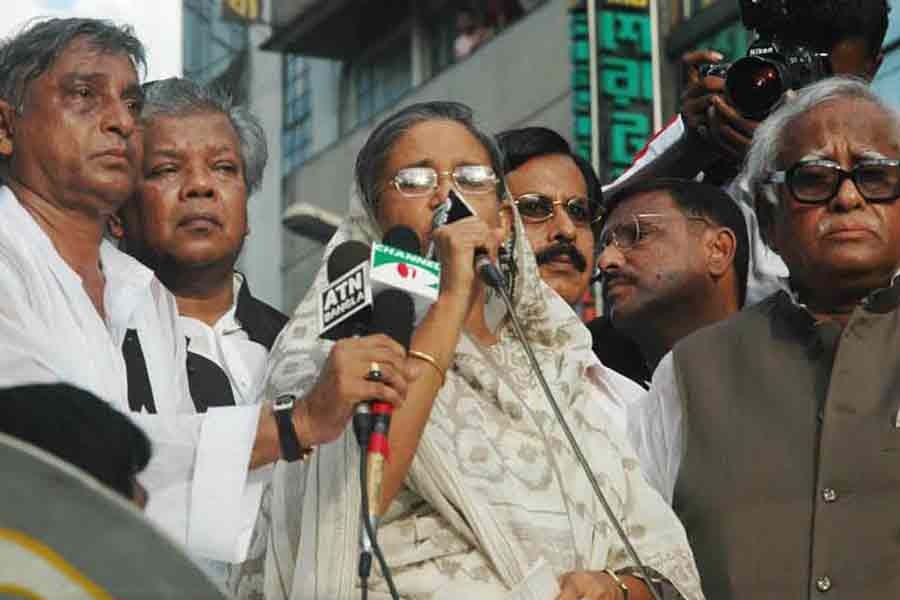The High Court is expected to start holding hearings soon on the death references and appeals of the convicts in the two cases lodged over the barbaric grenade attack on an Awami League rally in capital's Bangabandhu Avenue on August 21, 2004, as the necessary preparations are almost completed.
Supreme Court spokesperson Mohammad Saifur Rahman said, "Overall preparations are at their final stage to start holding the hearing after preparing the paper books by scrutinising all the documents carefully."
“Initiatives would be taken to start hearing of the cases soon as per rule,” Rahman, also a special officer at the High Court Division, added.
While talking about the progress on holding hearings on the matters, Attorney General AM Amin Uddin said lawyers have already been appointed by the state to defend the fugitive convicts in the two cases and initiatives would be taken to start holding hearings soon on a priority basis.
At least 24 people were killed and around 300 injured in the gruesome attack on an Awami League rally on the capital’s Bangabandhu Avenue on August 21, 2004.
Awami League President Sheikh Hasina, the then opposition leader in parliament, narrowly escaped the attack with severe ear injuries.
A Dhaka court on October 10, 2018, sentenced 19 people to death including former state minister for home Lutfuzzaman Babar and awarded life imprisonment to another 19 including BNP acting chairman Tarique Rahman in the murder case filed over that heinous incident.
Judge Shahed Nuruddin of Dhaka’s Speedy Trial Tribunal in his judgement also sentenced 11 others to different terms of jail.
The judge also made a 12-point observation on the background, motive and consequences of the attack, mainly targeting the incumbent Prime Minister and the then opposition leader Sheikh Hasina, who narrowly escaped the assault sustaining wounds.
The death penalty convicts are Lutfuzzaman Babar, Salam Pintu, Mawlana Tajuddin, intelligence officials Major General (retd) Rezzakul Haider Chowdhury and Brigadier General Abdur Rahim, transport operator Md Hanif, militants Mowlana Sheikh Abdus Salam, Abdul Mazed Bhat, Abdul Malek, Shawkat Osman, Mohibullah, Abu Sayeed, Abul Kalam Azad, Jahangir Alam, Hafez Abu Taher, Hossain Ahammed Tamim, Moin Uddin Sheikh, Rafikul Islam and Md Uzzal.
Other than Rahman, the political figures who were handed down life imprisonments are — ex-premier Khaleda Zia’s the then political adviser Haris Chowdhury and former BNP lawmaker Qazi Shah Mofazzal Hossain Kaikobad.
The others to serve the life term are — militants Shahadat Ullah alias Jewel, Abdur Rouf, Sabbir Ahmed, Arif Hasan, Hafez Yahia, Abu Bokor, Ariful Islam, Mohibul Muttakin, Anisul Mursalin, Mohammad Khalil, Jahangir Alam Badar, Mohammad Iqbal, Liton, Shafikur Rahman, Abdul Hai and Ratul Ahmed Babu.
Assailants carried out the attack with military hardware “Arges grenades” on an anti-terrorism rally of the then main opposition Awami League while its president and incumbent Prime Minister Sheikh Hasina was visibly their prime target but she narrowly escaped the assault sustaining permanent hearing impairment.
Grenades were charged one by one towards the then opposition leader and incumbent premier Sheikh Hasina after finishing her speech as she stood on the makeshift stage on a truck.
Her security personnel and the party leaders and activists including the then Dhaka City mayor Mohammad Hanif, late Suranjit Sengupta, Mofazzal Hossain Chowdhury Maya, created a human shield risking their lives and saved the then opposition leader.
Two separate cases, one for murder and another under Explosives Substances Act were filed on August 22, 2004, and the police on June 9, 2008, filed the charge sheet. The court on September 29, 2008, framed charges in the case.
Investigation Officer and also Additional Deputy Inspector General of Criminal Investigation Department (CID) of police on July 2, 2011, submitted a supplementary charge sheet before the court and the court on March 18, 2012, framed charges afresh after taking the new charge sheet into cognizance.
The lower court on November 27, 2018, sent 37,385-page case documents including the judgement to the High Court for further proceedings. The High Court on January 13, 2019, accepted appeals filed by the convicts in the two cases filed over the August 21 grenade attack for hearing.
Though the stateside repeatedly said about taking the initiative to hold hearings on jail appeals and death reference in two cases lodged over the August 21 grenade attack, on a priority basis, the process was severely hampered by the ongoing pandemic situation, forcing the apex court to defer their regular activities.


